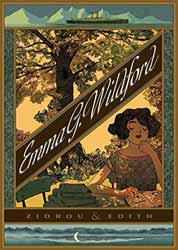|
Click here to return to the main site. Graphic Novel Review
Emma G. Wildford is suffering the stifling heat of a country summer and the oppressive presence of various men in her life. As she works on her poems, Emma’s thoughts are always on her missing fiancé, Roald Hodges. Hodges had taken an expedition into the frozen north in search of the tomb of a goddess, but nothing has been heard of them for a long while. He left Emma a letter, one she has yet to open, for to do so would mean that she has accepted that he is dead... Emma G. Wildford (Hardback. +2018. 104 pages) is a new graphic novel by Zidrou (text) and Edith (art), the book was translated from the French by Marc Bourbon-Crook and edited by Jonathan Stevenson. The book is set in England during a particularly hot summer, in the nineteen twenties. Emma is contemplating the loss of her fiancé and the restrictions placed on her life. Her mother has left; her father will not talk about her. A close family friend feels that the excuse of being drunken excuses him for her rape and in the Royal Geographical Society she meets misogynistic resistance to her desire to go looking for Roald. Against all these restrictions and pressures Emma keep her determination and set off looking for Roald. She does not find what she expected, but along the way she discovers the freedom she needs. Much of the art is presented in a range of autumnal colours, that is, until she reaches the northern most part of Scandinavia, where Edith switches to colder blues and whites. The darker browns and greens of the books opening, where Emma feels both personally and socially constrained are in contrast to the brighter colours of the book's endings where Emma has found validity and self-determination. The pen and ink drawings give the book a distinctive style, with the addition of an art deco cover as well as deco front and end pages. The story of self-discovery by Zidrou, is not afraid to produce periods of intense quiet, which allow the panels to tell the story, while at the same time creating a very empathetic character. Emma is wronged in so many ways and yet is able to overcome life’s obstacles. There were only a couple of issues with the book, the first is very picky in that it is stated that Agatha Christie wrote Sherlock Holmes, which she clearly didn’t. The second is a little more substantial. For the most part the text is very legible, except when Emma is reciting some of her poetry. The script can sometimes be a little difficult to read with complete ease. It is an altogether thoughtful and thought provoking study of individuality and the strength of femininity. 8 Charles Packer Buy this item online
|
|---|


